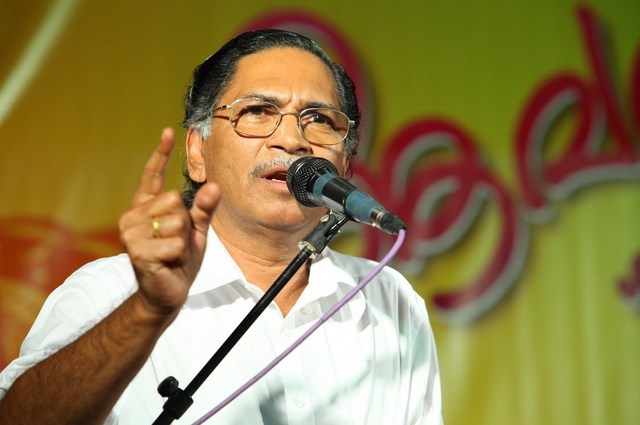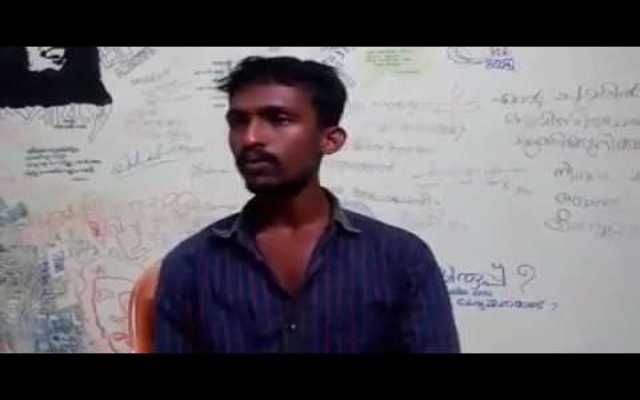20/09/2016
Meter/metre was something that had deterred too many people from writing poems at some point of time. But during modern times, poets all over the world went into free verse style, revolutionizing the very idea of poetry. Perhaps, this revolution made poetry more democratic and liberal, by letting ordinary people express their emotions and ideas in free verse.
V. Madhusoodanan Nair, himself a pedagogue, poet and singer, arrived on the Kerala literary scene with his re-rendering of romantic poems written by Vayalar Rama Varma, Vyloppilli Sreedhara Menon, Vallathol, Kumaran Asan and so on. Before Nair, Balachandran Chullikkadu and O.N.V. Kurup, and to certain extent Sugatha Kumari, had established a ‘modern singing tradition’ for contemporary poetry. But Nair almost erased the demarcating lines between his own poems and those of the others through his captivating rendering style.
If Sam Mathew, the controversial ‘Sakhavu’ fame, remains a poet churning out romantic poems, then it has to be seen in the context of the poetry recitations initiated by none other than Nair. Murukan Kattakkada, another poet striving to flag social issues through his poetic recitations, further widened this scenario by attracting many youngsters who couldn’t write good poems but could recite them. Poems, like miniature paintings, have the capacity to establish personal relationships with the readers. Poetic enjoyment is a private pursuit primarily. However, the deliberate attempts to democratise poetry and bring it to the public domain had made it a part of the public performances of the poets or who mimic them. Television, in its frantic search for fresh software to keep people hooked, even went back to poetry recitations, evoking a fair amount of nostalgia. That also coaxed many to take up poems as a medium of expression, especially in campuses.
Mathew says when he was a student in CMS College, poems of Pablo Neruda and Garica Lorca were used for spreading revolutionary messages and create aesthetical barricades against the college administration. Though it sounds exciting and sublime, I find it quite ironic for the simple reason that ever since 1970s when Kerala’s college campuses were on fire and the youth rose against the autocratic and fascistic tendencies in Indian politics, the very same poems were used to express their angst. That means even after four decades, we are still groping around Neruda and Lorca. We haven’t helped in establishing new revolutionaries or we have to accept the fact that our society hasn’t created enough revolutionary poems that have become a part and parcel of the cultural consciousness of the general public. There is no problem if we still find our inspiration from Neruda, but it looks slightly anachronistic when poets like Mathew, born after India had adopted liberal economy in 1991, haven’t found any different voices of protest.
Sakhavu was celebrated as a new campus poem and it was cited as an example for the revival of poetic interest in Kerala campuses besides having debates on poetry in campuses itself. But it’s unfortunate to see how the campus poetry is still hovering around the revival poetry of Nair and his ilk. Mathew’s freshly presented poem titled ‘Padarppu’ (Spread) in the television program JB Junction anchored by John Brittas has an absolutely retrogressive subject. Besides, the narrative pitch belongs to the Nair school of poetry recitation. The poem deals with a girl who has been raped and impregnated by a man, and the love that she slowly develops for her attacker. She has a child growing in her womb, and according to the poet, love could be one way of wrecking revenge on her attacker. The poem turns out to be an indirect acceptance of rape as the beginning of a possible conjugal life. The practice of a rapist avoiding legal consequences by marrying the victim is a common outcome in several rape cases in rural India. The marriage contract with the attacker, however, doesn’t give justice to the victim apart from the social acceptance of that instance of rape as a sexual relationship between two people before marriage. Even the victim could be accused of inviting the rapist to ‘rape’ her. The gradual erasing of the violence and trauma involved in a rape through marriage, in fact, blunts all the movements against rape. A victim falling in love with the rapist is a romantic solution, nullifying the subjectivity of the victim altogether. A grave crime like rape is equated with the flirtations seen in most of the mainstream movies in India where the girl finally falls for the ‘charms’ of the man who teased her.
Mathew models his poems metrically on the works of Nair, and for the sonic pleasure, he recites the poems exactly the way Nair does. Whether one would like it or not, Nair is a revivalist poet who revives not only the subjects of an erstwhile golden era, but also the poets of those nostalgic times to claim validation for his own poems and renditions. By following the same style, Mathew ideologically brings about a huge backlash on the campus poetry, pushing the creative minds many decades behind time only because they too seek approval of the sedated audience of television and social media. Brittas brought the other claimants of fame, Pratheeksha Sivadas, who had alleged Mathew of plagiarism of her own poem, and Aarya Dayal whose rendition had made ‘Sakhavu’ a viral phenomenon, in the same program. The veteran journalist, however, didn’t ever address the nuances of campus aesthetics or the allegations of plagiarism. Besides, Brittas trivialized the debate by dealing with the issue of ‘rape’ as something that could be easily committed by any, including Mathew! Kerala’s cultural discourse needs more serious and effective interventions than such episodes of JB Junction.
(Photo credit: Nagarjun via Foter.com / CC BY)


